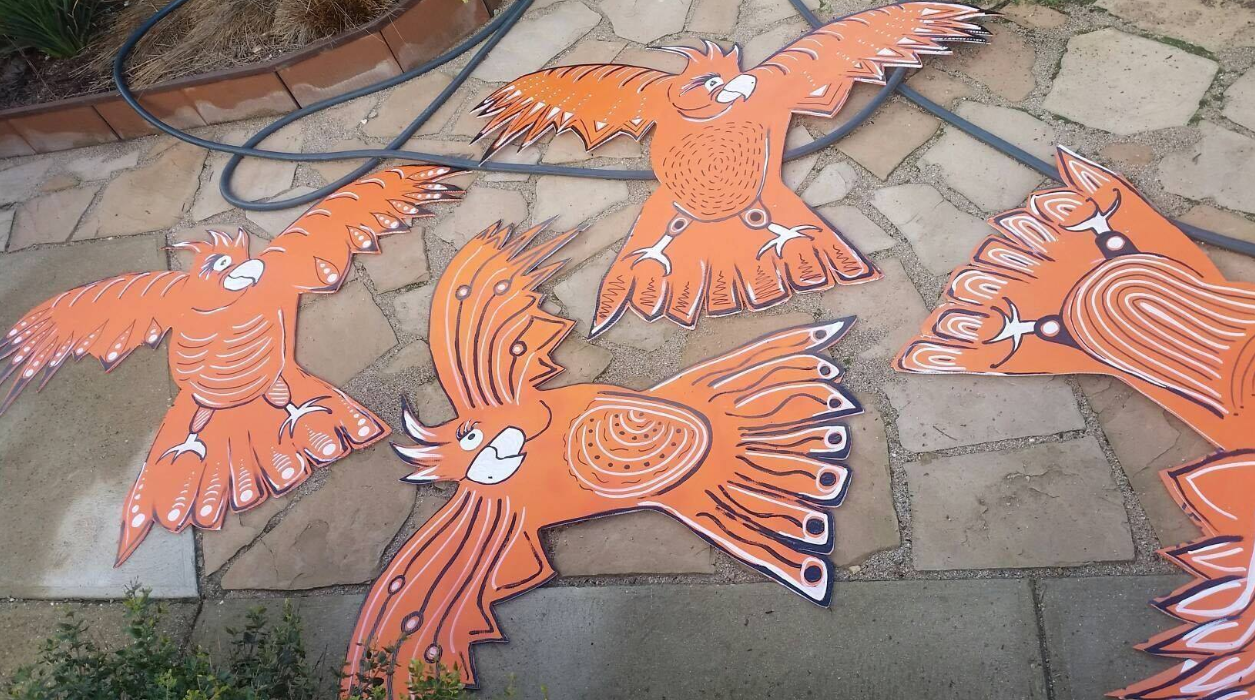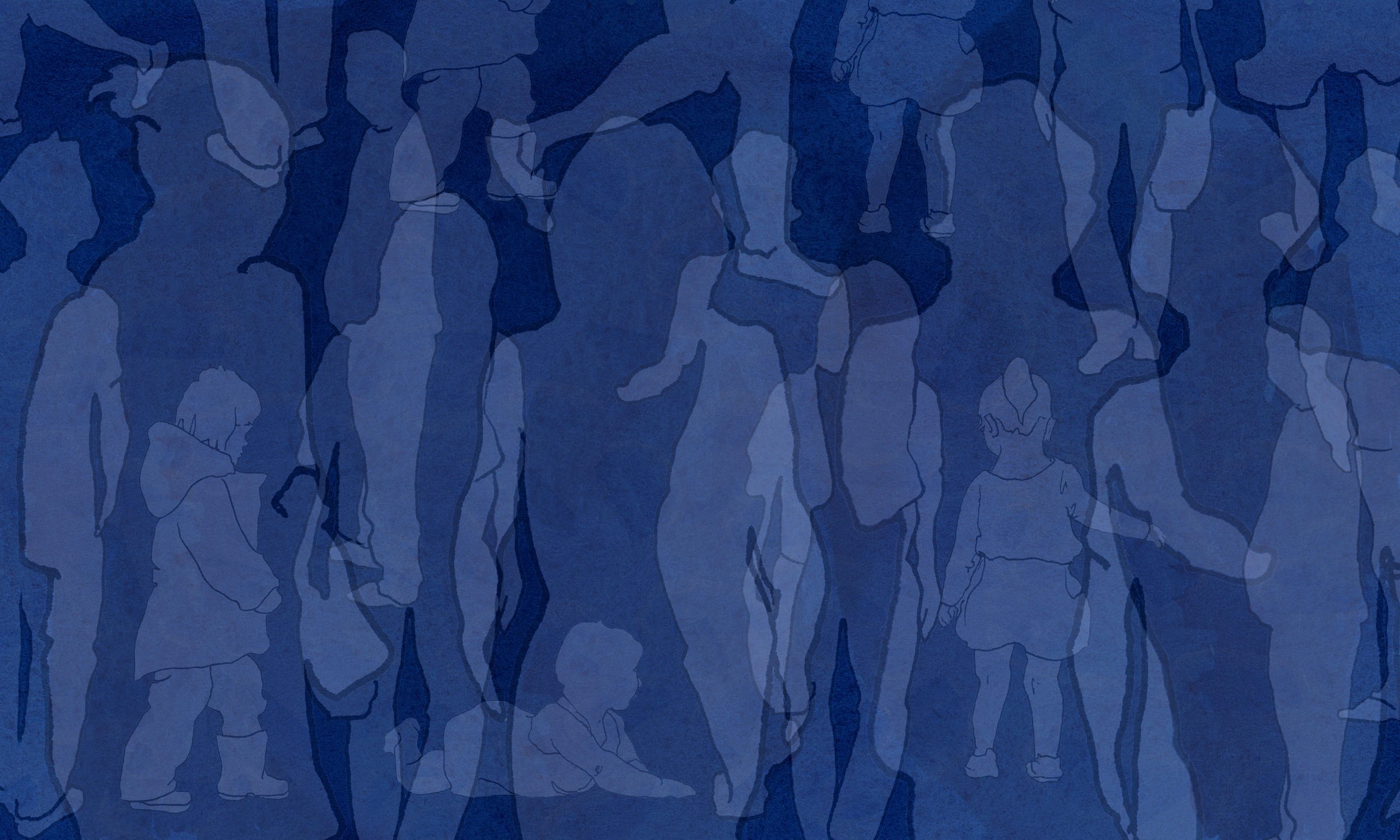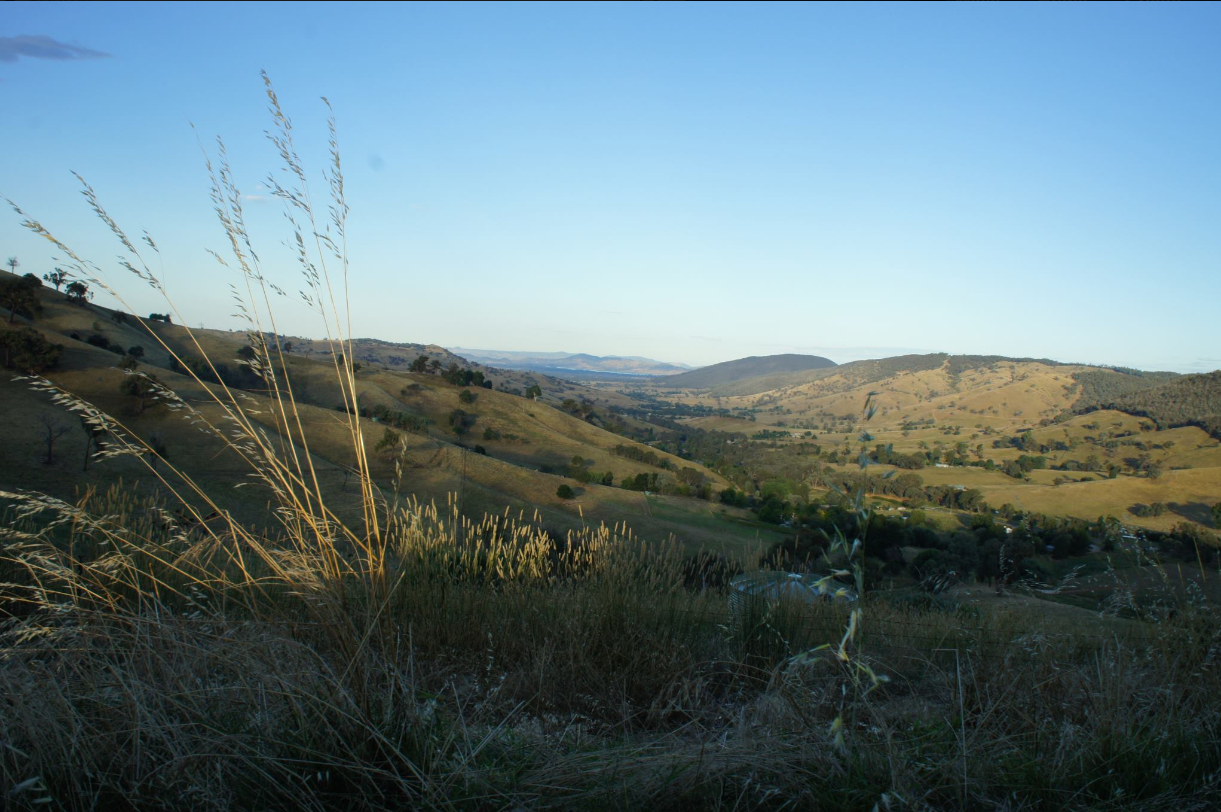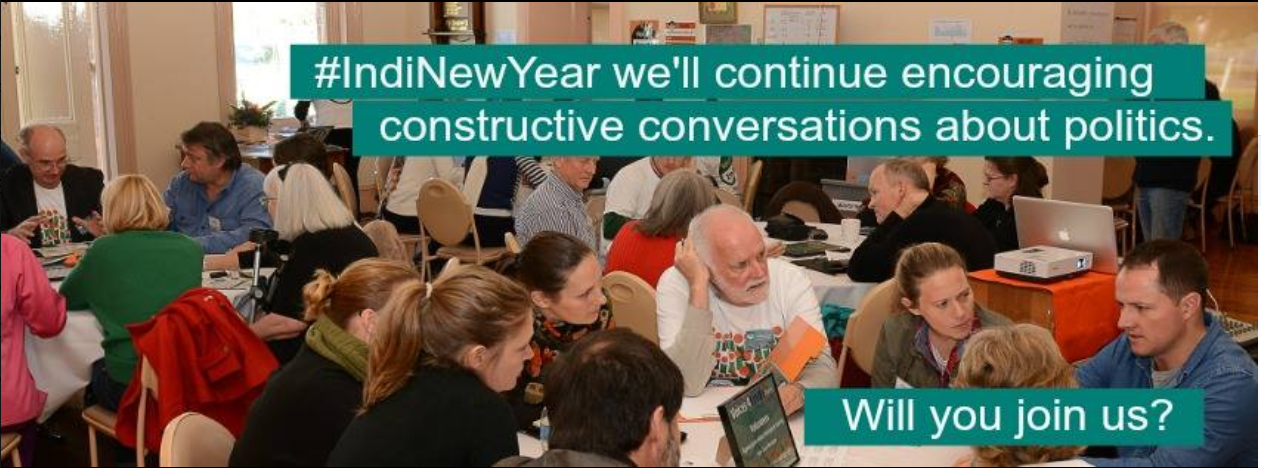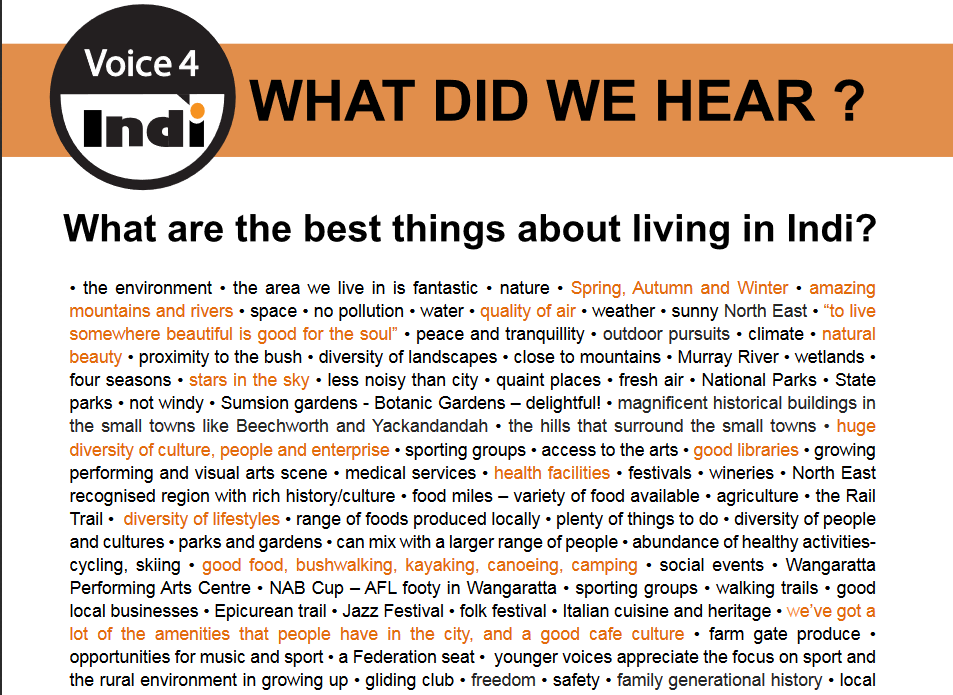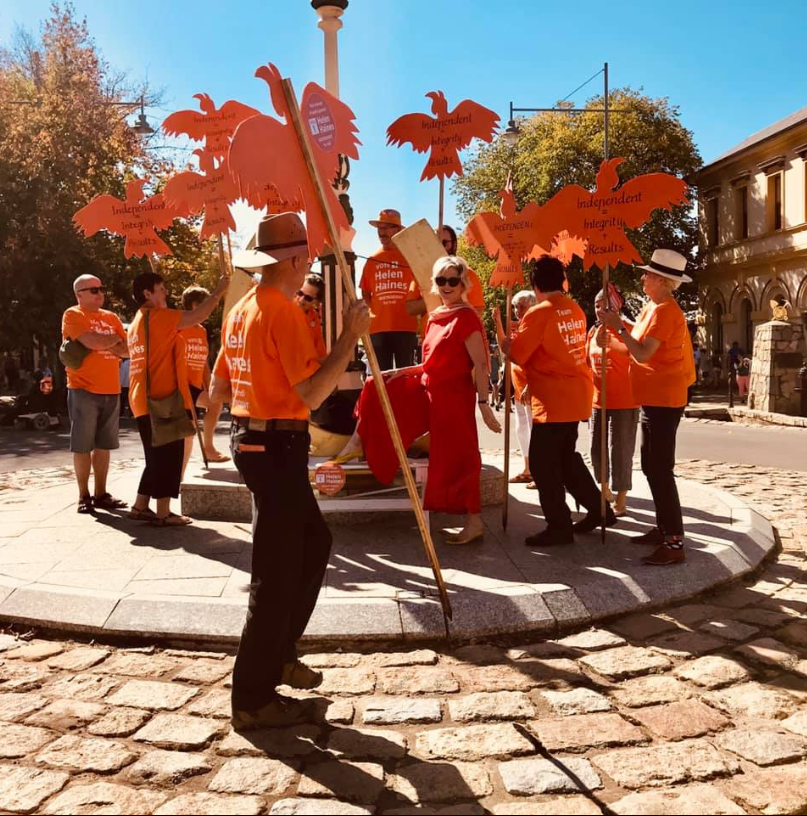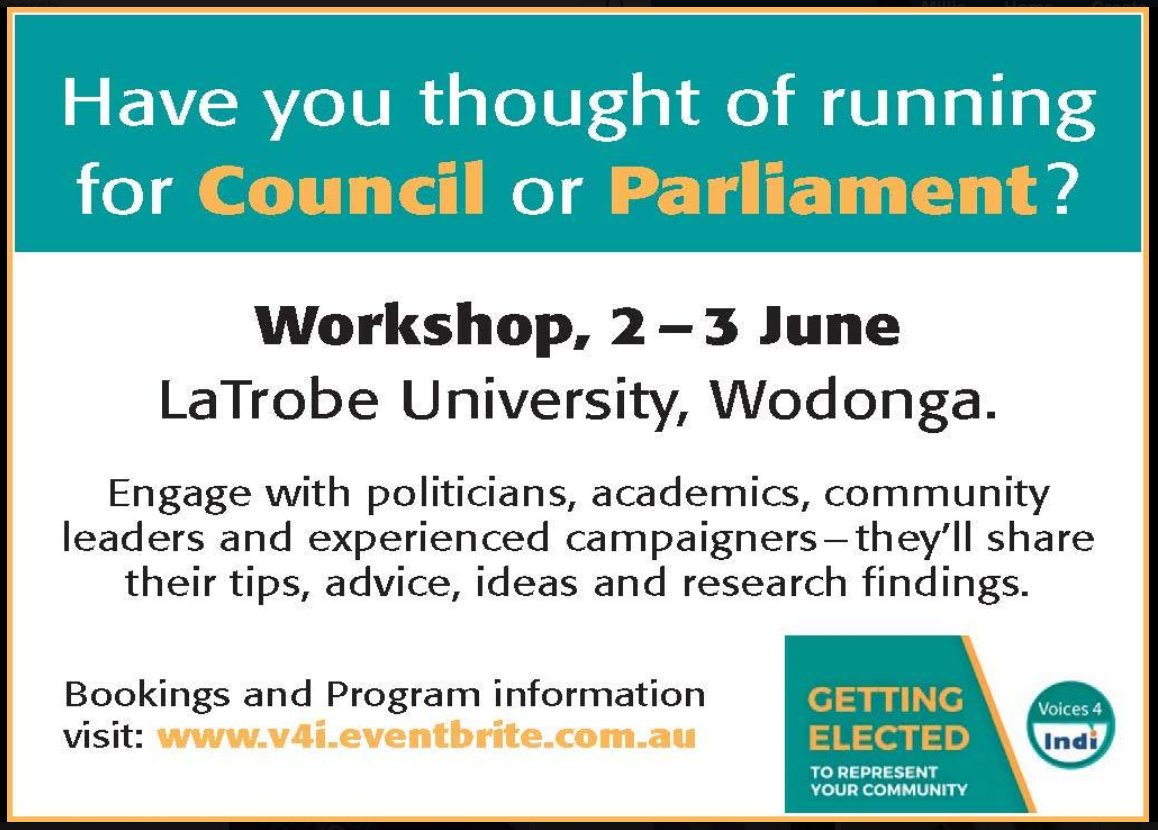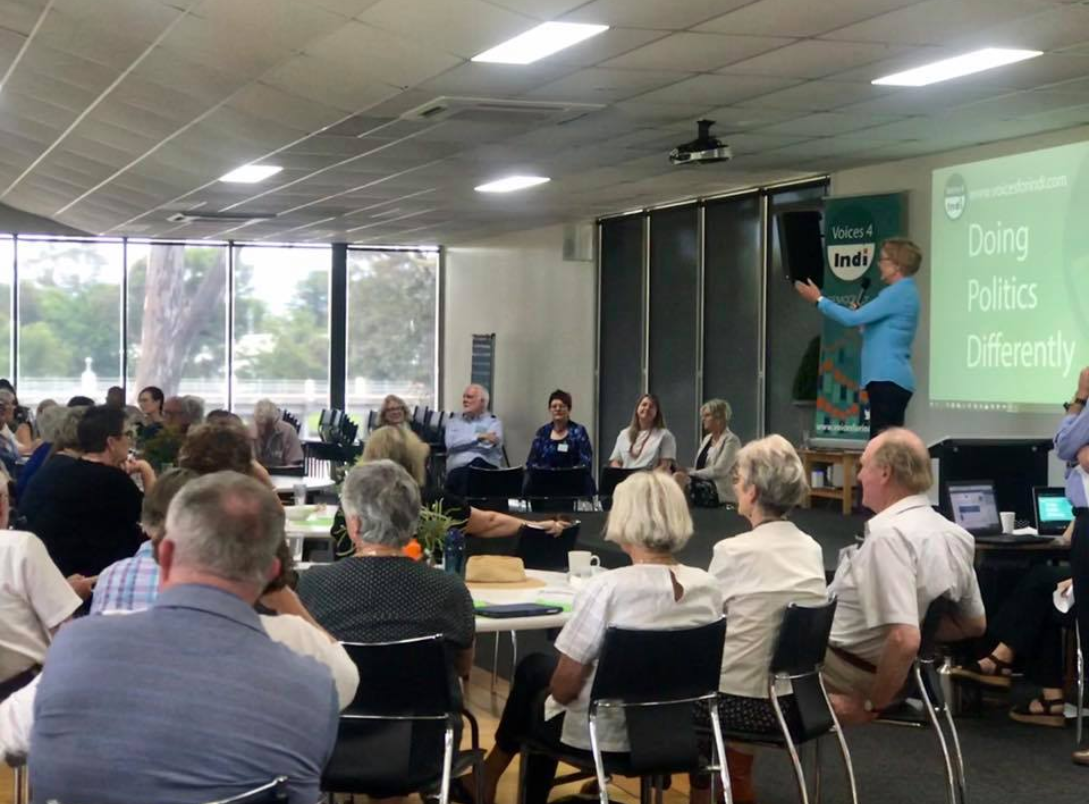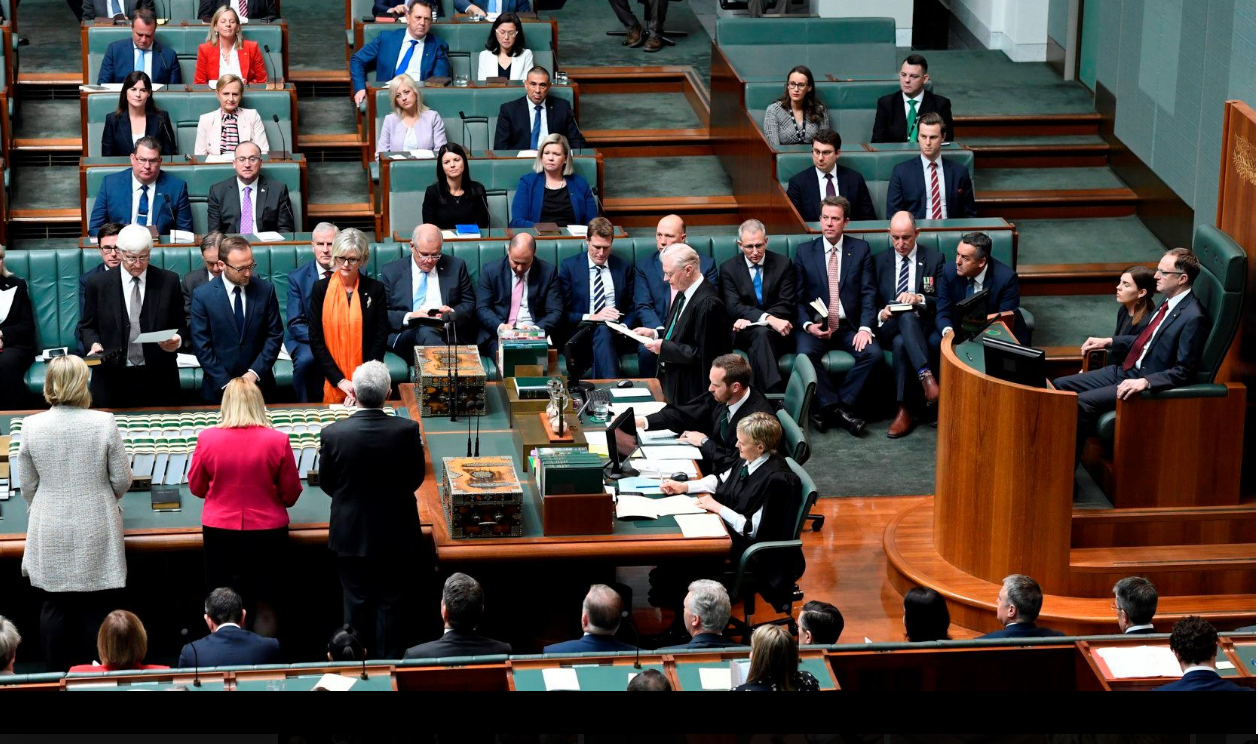From trepidation to transformation: democracy, Indi-style
“Our government exists for the people. Because we value a strong democracy we are engaged and thoughtful citizens. We know how democracy works and we are confident to play our part in large and small ways. We are not afraid to speak up, initiate political action and work together for the common good of our country – at election time and on every other day of the year.” -Pillar 8 “A Thriving Democracy” - Vision for Australia reMADE.
In Pillar 8 of our Vision for Australia reMADE, we describe the democracy of our dreams. It’s a vision not just for a different kind of politician, but a different kind of politics. It’s democracy as something we do, not just something we have. And like all aspects of our Vision for Australia, it already exists in flourishing pockets around this country.
Meet Indi, the rural electorate in Victoria, which made history at this election when it elected Independent Helen Haines, following the resignation of fellow Independent Cathy McGowan, in what had historically been an ultra-safe Liberal seat.
How did they do it, and more importantly, why?
Australia reMADE was thrilled to sit down with two leaders from Indi, to learn what they had to say about rekindling our power as citizens to build the democracy we dream of; and how a politics based on integrity, engagement, kindness and radical trust can not only win, but transform.
From trepidation to transformation: democracy, Indi-style
“It’s not just moving from one place of feeling under siege or feeling worried or threatened; to somewhere else. It’s actually a transformation. A way bigger journey. A massive change in how people are, how they talk about politics, how they raise their children to get involved, how they feel confident and own their role as a citizen in a democracy. I’m not saying this is all perfect and idyllic stuff.” - Denis Ginnivan, Voices for Indi
On August 1, in the company of over 200 volunteers from the Victorian electorate of Indi, Independent MP Helen Haines gave her first speech to Parliament where she noted, “They are here because, like all Australians, this is their House.”
Denis Ginnivan and Phil Haines (both members of Voices for Indi or V4i) are two of the 1,700 volunteers on Haines’ campaign team and both have spent the past three election cycles imagining ferociously and turning imagination into action.
A massive change in how people are, how they talk about politics, how they raise their children to get involved, how they feel confident and own their role as a citizen in a democracy.
I had the pleasure and privilege of meeting both Denis and Phil at the Progress Conference in June. I attended their presentation which they gave with Trudi Ryan on the Indi campaign and came away buzzing and excited. I was struck by the emphasis on ideas of kindness, radical trust and values in the work they do.
Here, before my very eyes, was an example of “a thriving democracy, where government exists for the people. Where strong democracy is valued and creates engaged and thoughtful citizens. Where people know how democracy works and are confident to play their part in large and small ways. Where people are not afraid to speak up, initiate political action and work together for the common good of our country – at election time and on every other day of the year,” (see Pillar 8 – A thriving democracy).
Talking to Denis and Phil, it became clear that V4i has always been about more than getting a candidate elected. As Denis explained, “In Indi, two things were up for election, not just who was going to stand for election but the whole way that politics would be done”.
I love the audacity of the V4i approach. I love that they decided to do politics in a new way before, during and after the formal election processes and in doing so actually created an electorate with a thriving democracy. Phil and Denis acknowledged this saying it felt like a process of “trepidation to transformation.”
Image from V4i Facebook page
Indi is a rural electorate full of small country towns and regional centres where everyone knows everyone and, like many regional areas, populations tend to be socially conservative. What troubled the initial V4i team was not necessarily the conservative agenda but rather the lack of political engagement in the community.
In 2012, the representative for Indi was Liberal MP Sophie Mirabella and according to Phil, “Since Indi had been a safe seat for decades, with little incentive or interest for the major parties to focus on delivering for the electorate, many people thought engaging in politics was futile. When V4i decided to support an independent candidate in the 2013 election, some people were concerned about being involved and having their say, even fearful that this could adversely affect their future business or employment opportunities.”
No one would talk about politics publicly.
And now?
“I can go into any pub… or can go to any community now, and I can’t believe how easy it is to get into a conversation with people about politics. And not party politics – ‘love one, hate the other’ - but their interest and responsibility in the political process,” says Denis.
They feel a part of it, in large part because in Cathy McGowan and now Helen Haines, they have two independent MPs who have lived in the community for a long time and are part of that community. First and foremost, they ‘belong’ to the community, not a political party.
Image from the V4i website, 2015
What could possibly have moved this community from trepidation to transformation? Denis’ answer was ridiculously simple: just invite people to the conversation and genuinely listen and take note of what they say.
So listening carefully to these wise, kind, down-to-earth men talk about the campaigns they’ve led – not one, but three times – and the communities they’ve transformed, here are the lessons I believe we can all take away about how to revitalise democracy, re-inspire citizens and create communities where we’re active on Election Day, and every other day of the year.
Make political engagement safe: actually listen
V4i held Kitchen Table Conversations with people across the electorate. A kitchen table conversation was a structured opportunity for people to get together with others from the community and talk about what was important to them. In 2013, 425 people participated in 53 conversations across 39 postcodes. Hosts were given a kit that included prompt questions such as:
What makes a strong community?
What are the best things about living in Indi?
Are there any particular issues or concerns that you feel should be brought to the attention of your elected representatives?
What do you think makes a really good political representative?
Do you feel you have an adequate voice in the way you are represented? If not, why not?
What would make for a stronger relationship between people and elected representatives?
Every conversation was recorded and collated and then full notes published so that everyone could see that their key ideas had been heard (even if the V4i coordinators didn’t agree with every point made). It set the context in which disagreement was not inherently bad, and in doing so, made political conversation safe.
As Phil said, “People want to get involved in a way that doesn’t threaten their safety or livelihoods. I think what we’ve done now is to allow people to be involved, and to have their say and to contribute in whatever way they want to. And I think for many people that’s been quite enlightening. People think they can do stuff that’s important to them, and do it in a safe, purposeful way.”
Australians like democracy. Research shows again and again that while we are currently angry, disappointed and generally switched off when it comes to politicians, we’re actually passionate about good democracy and searching for ways to get involved.
V4i has shown that one simple piece of the puzzle for switching Australians back onto politics is to invite people into the conversation and make it safe to do so. The culture of an electorate and the way it engages with politics can be changed. As was demonstrated for the first time in Indi with the election of Cathy McGowan in 2013, this can happen very quickly.
Place values at the heart of who you are and what you do
“Doesn’t mean you’re a walkover because you have values.” - Phil Haines, Voices for Indi
Another way that V4i made political participation safe was to lead with values. They did this in two important ways. First, volunteers were trained not just in the messaging spiel but in how to inhabit the shared values of the campaign. V4i is built around four key values: involvement, integrity, honesty and diversity.
Caring about values and individual participation, rather than obsessively controlling all the talking points, gave authenticity to the campaign but also provided ways for people to engage that felt true to them. No one is having to remember slogans or worry if they get asked a curly question; they can answer from their own perspective and experience. People could make links to Haines’ policy in a way that had integrity to them rather than simply spouting party lines.
The orange cockatoo was an important symbol for the Helen Haines campaign
Secondly, having signed the values-based pledge (the only requirement for volunteers to sign on to the campaign), all campaign volunteers knew that anyone in a Helen Haines’ orange shirt, or at any campaign meeting, shared the same vision and intent. This helped to instantly build trust among the 1,700 volunteers across a wide geographic area. The teams had the catch cry to check in with each other as groups and individuals, to ensure they were putting those values into practice: “Are you being your best self?”
Values were not just about what was said but about how things were done. Joy, kindness and a bit of cheeky enthusiasm were key to the V4i success. And yet those words seem so far removed from the cynical and cutthroat portrayal of contemporary politics. Phil and Denis are clearly used to this element of their campaign approach being dismissed as unusual and not the main bit of the game.
Both men were keen to point out that centring values and integrity doesn’t mean that you’re a walkover, but it does mean drawing on them when it comes to fighting back against dirty oppositional tactics. Cathy McGowan and Helen Haines had campaigned not only on the topic of integrity, but in a way that demonstrated integrity. In doing so, they raised expectations about values and behaviour during the campaign process as a whole. Integrity became the new currency that voters asked about at Town Hall meetings. Values became the unifying strength.
Once again, V4i didn’t wait to have a representative elected to begin doing politics in a different way. They didn’t ask for permission. Three elections in, and it’s clear this approach isn’t “weak” at all.
Trust a radical trust approach
Imagine handing out debit cards to campaign volunteers and saying ‘go for your life!’ Imagine the volunteers responding, ‘Heck no! Just tell us what to do!’
There was initial resistance to the campaign push to give power to volunteers. Denis laughed as he said, “Some people wanted to go back to the old ways of ‘we’ll just do what you tell us.’ And we’d say, ‘you’re talking to the wrong people if you want us to tell you what to do. We want you to assume your own power.’”
So trust was handed over to members of the Helen Haines campaign team, not only in how campaign messages were constructed, but also in the practical, financial and logistical elements of the campaign. But radical trust began way earlier...
Selecting a new candidate
V4i trusted their community to choose their own candidate. First, the V4i crew began educating and supporting the electorate to encourage people to put their hands up as a candidate. Open to anyone interested (including members of political parties), they held a ‘Getting Elected – To Represent Your Community’ workshop in June 2018 on what it means to run for parliament and to be a parliamentarian or to support a candidate. They talked about the impact on spouses and families; about trends in Australian politics, young people in politics, listening to your community, representing your community, policy, voting patterns (psephology!), working with media, insurance and campaign strategy.
Next, they encouraged people to apply to the V4i group and then, using an approach that enabled participation from all members, invited people to a day-long candidate selection process.
Approximately 200 people attended the forum at which three potential candidates gave presentations, answered questions and were generally grilled by the community.
Given the way politicians are treated by the media, and each other, these days, I wanted to know why anyone in their right mind would nominate. Being a politician looks incredibly hard and to then be forced into competition with members of your community on a public setting doesn’t sound much fun. This was a deliberative process with the aim that the group would reach consensus; that all those in the room would be comfortable with the candidate invited to step forward.
Denis was very clear on this point. The important thing was that every one of the three potential candidates who put themselves forward knew that they had the support of the V4i committee, and the 750 or so supporters of previous independent campaigns; and that they were respected, valued and supported. Should they become the candidate they could also have the full ‘Orange team’ campaign expertise, resources and infrastructure at their disposal.
As Denis explained, would-be candidates knew that, “If you are offered the chance you will have at your disposal this fairly formidable campaign group, if you so want them. You don’t have to have that group, but ‘campaign orange’ is there with a lot of experience and resources.”
“It was much more than money: ground troops, previous experience, it was the broad network of contacts across the community and the ‘R’ word – relationships, which was so important and fundamental to the campaign.”
People considering running knew that their community had their back.
No one from the V4i Indi committee voted in the final candidate vote. As Denis put it, in a “crazy brave” move, they trusted the 200 plus community members to make this choice. And importantly, while the offer of community campaign infrastructure was there, the successful candidate would not be required to use it or access it. They truly were open to any community selected independent running things their own way.
So the notion of radical trust worked in numerous ways. The community trusted the candidate, V4i trusted the process and the candidate had to trust the community.
Ongoing trust post-election
It’s one thing to win one election. It’s another to win again. And then again. I wanted to know why the independents were so successful and had continued to be since Cathy McGowan was first elected in 2013.
The ongoing trust between the MP and campaign volunteers surprised me and opened up possibilities for how politics might be done between elections. An initiative of Cathy McGowan’s (which Helen Haines intends to continue) is to invite into Parliament not only campaign volunteers but also those who may not have voted for her.
The Orange campaign team have shown that the strong relationships built on trust developed during a campaign, can actually be maintained and supported once a candidate is elected. They were given the freedom to work on issues important to them as individuals, rather than as representatives of McGowan.
Helen Haines being sworn into the 46th Parliament of Australia
In fact, prior to deciding to run as a candidate, Helen Haines did some volunteer time. At one event she had the opportunity to speak over drinks with the then Minister for Health, Ken Wyatt. She was “only” a volunteer; yet she worked up the courage to introduce herself and speak to him about a local nursing home situation in Indi. As a result, when he traveled to Indi the following month, he visited the nursing home and saw first-hand some of the innovations that they had successfully introduced. Again we see radical trust in action: the decision to let people follow their own needs and instincts, but with scaffolded support.
That Cathy McGowan was able to establish a volunteer program to bring members of her electorate into Parliament, and to give up all control of the causes they might champion while there, is a brilliant model of citizen democracy in action.
Beyond that, as our conversation ended, Denis assured me that Indi was now an electorate full of people feeling empowered and excited to try out new approaches to all sorts of things (check out Totally Renewable Yackandandah for example).
While Denis cheerfully notes that there is always room for improvement, V4i truly does lay the foundations for how power can be shared and community strengthened, rather than how power can be held for its own sake.
As Helen Haines said in her first speech to Parliament:
“The vision and leadership of a small group of people who began Voices for Indi in 2012 started a great big community conversation about doing politics differently. What they created is what has been described as ‘new power’—open, participatory and peer-driven. It operates on shared values and radical trust. The Voices for Indi movement has given inspiration to other electorates around the nation modelling new democratic norms. In a growing number of democracies across the world we are seeing the impact of an erosion of trust in democratic institutions. Disengagement from politics is being exploited into fear and polarisation. In Indi there is a different story. Division and polarisation are not the inevitable outcome of disengagement; it can be channelled productively. This election has shown that this model, though time consuming and labour intensive, has staying power.”
Congratulations to Helen, to Cathy; to Phil and Denis, and to all the people of Indi.
Thank you for showing us, with good doses of humour, grace, grit — and what Helen calls a ‘defiant optimism’, — a different way that politics can be done.
For more, see, “Uncommon victories: lessons from Warringah and Indi.”
DR MILLIE ROONEY
Millie is the National Coordinator for Australia ReMADE. Millie has a qualitative research background and has spoken in-depth with hundreds of Australian's about their lives, communities and dreams. She has worked in and around universities for over a decade building student capacity and enthusiasm for tackling wicked problems. Millie is also a carer for her family and community and is passionate about acknowledging this work as a valid, valuable and legitimate use of her time.

